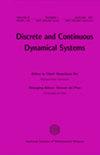放大成完全分数式热方程
IF 1.1
3区 数学
Q1 MATHEMATICS
引用次数: 1
摘要
我们用$ p>0 $研究了完全分数热方程$ \mathcal{M} u = u^p, \qquad x\in\mathbb{R}^N, \;0<t<T $的爆破解的存在性和行为,其中$ \mathcal{M} $是由时空核$ M(x, t) = c_{N, \sigma}t^{-\frac N2-1-\sigma}e^{-\frac{|x|^2}{4t}} \mathbb{1}_{\{t>0\}} $, $ 0<\sigma<1 $给出的非局部算子。这个算符与热算符的分数幂相一致,通过半群理论定义$ \mathcal{M} = (\partial_t-\Delta)^{\sigma} $。我们刻画了全局存在指数$ p_0 = 1 $和藤田指数$ p_* = 1+\frac{2\sigma}{N+2(1-\sigma)} $。我们还研究了$ p_* $下面的爆破解趋于无穷$ \|u(\cdot, t)\|_\infty\sim (T-t)^{-\frac\sigma{p-1}} $的速率。本文章由计算机程序翻译,如有差异,请以英文原文为准。
Blow-up for a fully fractional heat equation
We study the existence and behaviour of blowing-up solutions to the fully fractional heat equation$ \mathcal{M} u = u^p, \qquad x\in\mathbb{R}^N, \;00 $, where $ \mathcal{M} $ is a nonlocal operator given by a space-time kernel $ M(x, t) = c_{N, \sigma}t^{-\frac N2-1-\sigma}e^{-\frac{|x|^2}{4t}} \mathbb{1}_{\{t>0\}} $, $ 0<\sigma<1 $. This operator coincides with the fractional power of the heat operator, $ \mathcal{M} = (\partial_t-\Delta)^{\sigma} $ defined through semigroup theory. We characterize the global existence exponent $ p_0 = 1 $ and the Fujita exponent $ p_* = 1+\frac{2\sigma}{N+2(1-\sigma)} $. We also study the rate at which the blowing-up solutions below $ p_* $ tend to infinity, $ \|u(\cdot, t)\|_\infty\sim (T-t)^{-\frac\sigma{p-1}} $.
求助全文
通过发布文献求助,成功后即可免费获取论文全文。
去求助
来源期刊
CiteScore
2.50
自引率
0.00%
发文量
175
审稿时长
6 months
期刊介绍:
DCDS, series A includes peer-reviewed original papers and invited expository papers on the theory and methods of analysis, differential equations and dynamical systems. This journal is committed to recording important new results in its field and maintains the highest standards of innovation and quality. To be published in this journal, an original paper must be correct, new, nontrivial and of interest to a substantial number of readers.

 求助内容:
求助内容: 应助结果提醒方式:
应助结果提醒方式:


